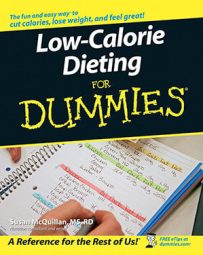What happens when you don’t eat? You set yourself up for a binge in the not-so-distant future. Food deprivation never helped anyone lose weight in the long run. The trick is to figure out if you’re really hungry, and to eat just enough to satisfy your hunger. One way to know if what you’re feeling is true physical hunger, and not emotional hunger, is that when you’re truly hungry, you’ll feel better by eating just about any type of food. When you’re emotionally hungry, you usually crave very specific types of foods that you’ve used to comfort yourself in the past.
One component of mindful eating that dietitians and other weight experts often use is a hunger scale, like the one that follows, that can help you determine just how hungry you are or how full you are. The scale ranges from 0 to 10, with 0 being so hungry you could eat a bucket of beans and 10 being so overstuffed you can’t get up out of your chair. You want to avoid these extremes by using this scale to decide when to eat and when to stop.
0 Extremely hungry
1 Very hungry
2 Hungry
3 Slightly hungry
4 No longer hungry but not yet full
5 Comfortable
6 Beginning to feel full
7 Beginning to feel too full
8 Uncomfortable
9 Very uncomfortable with a slight stomachache
10 Extremely overstuffed and uncomfortable; possibly nauseous
Whenever you’re following a low-calorie diet and you feel hungry, you need to eat. Period. Don’t give it a second thought. Better yet, try not to let yourself get to the point where you actually feel hungry. Eat something.

